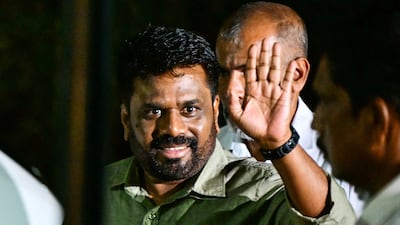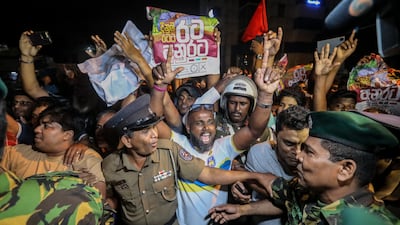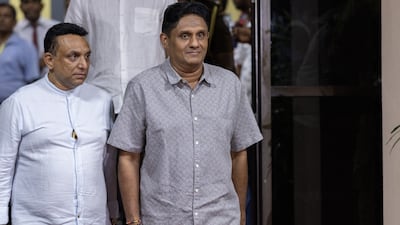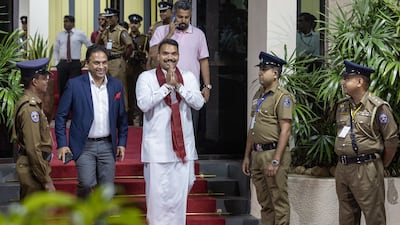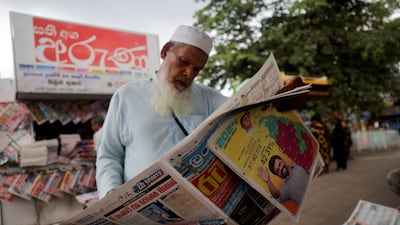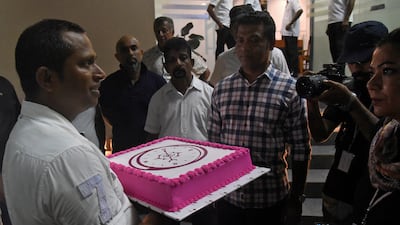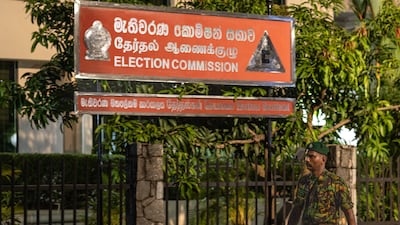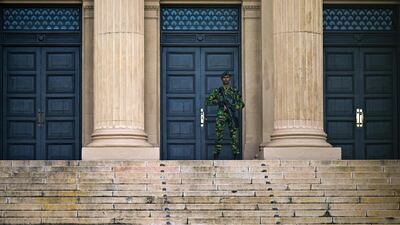Marxist leader Anura Kumara Dissanayake was sworn in on Monday as Sri Lanka’s 10th president, promising his best efforts to drag the island nation out of it worst economic crisis.
Mr Dissanayake, 56, from the Janatha Vimukthi Peramuna party (JVP), campaigned on policies benefiting the working class and against the political elite as part of a coalition of left-wing parties called National People’s Power (NPP).
The group took 42 per cent of the vote in Saturday's poll, Sri Lankan election authorities said. Mr Dissanayake's main rival, Sajith Premadasa, of Samagi Jana Balawegaya, won 37 per cent.
Incumbent liberal president Ranil Wickremesinghe, a six-time prime minister who most recently took reins after Sri Lanka had plunged into economic ruin two years ago, secured 17 per cent.
After taking office, Mr Dissanayake said: “I am not a conjuror, I am not a magician, I am a common citizen. I have strengths and limitations, things I know and things I don’t … my responsibility is to be part of a collective effort to end this crisis."

While seventeen million Sri Lankans were eligible to cast their ballots, turnout was 76 per cent. The Sri Lankan Election Commission ordered an unprecedented second round of counting on Sunday after no candidate had taken more than 50 per cent of the vote required to be declared winner the previous day. Mr Dissanayake won the election with 5.4 million votes.
The poll has been seen as a referendum against previous regimes and historic anomalies that led to Sri Lanka's worst economic crisis since the former British colony gained independence in 1948.
Sri Lanka’s tourism industry – representing one tenth of its GDP – was rocked by a series of bombings in 2019, which hit three churches and three luxury hotels on Easter Sunday, killing 269 people. The Covid pandemic hit a year later.
Sri Lanka experienced sharply rising inflation with an acute shortage of fuel and food. By 2022, it had exhausted its foreign reserves and its economy had contracted to 9.5 per cent, the World Bank said at the time.
The economic crisis prompted massive anti-government street protests and led to the ousting of former president Gotabaya Rajapaksa. He temporarily fled the country, a move resulting in his political demise.
Mr Wickremesinghe negotiated an International Monetary Fund bailout of $2.9 billion that meant austerity measures such as steep taxes. While the policies and the bailout helped the economy improve slightly, millions were struggling to make ends meet due to a high cost of living and increasing taxes. Mr Dissanayake has pledged to renegotiate the terms with the IMF for tax cuts.

Known for his oratory style often featuring calm but impassioned calls for reform, Mr Dissanayake attracted large crowds during the election campaign. He promised to end corruption, lower taxes and create closed-market policies to revive the economy, resonating with young voters in particular.
“People felt enough is enough and voted out the old politicians for betraying the people,” K Sandesh, 35, who runs a travel agency in the capital Colombo, told The National. "We wanted change and hopefully he will bring us out of this crisis. We have faith in this man."
Experts say Mr Dissanayake's victory reflects change in a country that has been ruled for too long by dominant elite parties.
“It marks a new beginning,” Jayadeva Uyangoda, emeritus professor of political science at the University of Colombo, told The National. "He is the first elected president who has come from a non-elite class. Political power has shifted from dominant elites to non-dominant social forces."
Mr Dissanayake, popularly known as AKD, was born into a farming family in Galewela, a multicultural and multireligious town in central Sri Lanka.
He started his political journey with the student wing of the JVP, a Marxist-Leninist party, which led rebellions in the 1970s and 1980s that left more than 80,000 people dead before renouncing the violence.
He became a parliamentarian in 2000 and served briefly as minister of agriculture under president Chandrika Kumaratunga in 2004-2005.
He contested presidential elections in 2019, going up against Mr Rajapaksa but landing only 3.19 per cent vote.
A turning point came in 2022 when the NPP front played a key role in supporting the people’s calls for social change.
“The main hope generated can be summarised in one word – change,” Prof Uyangoda said. "Change for the better. The citizens' protest came out with a slogan called 'system change' and the new president has emerged in that context of citizens' expectations of change.
"There is a sense of economic injustice. He has promised to relieve the people of these unfair burdens … and bring democracy, corruption-free government, [an] end to crony-capitalism, accountability and protection of citizen democratic rights.”
